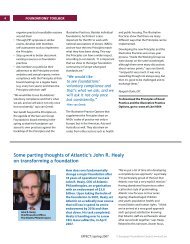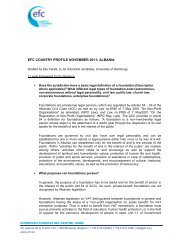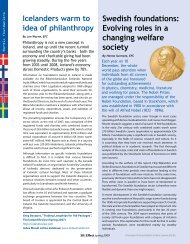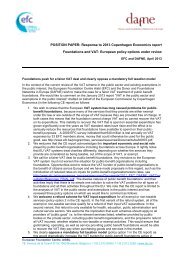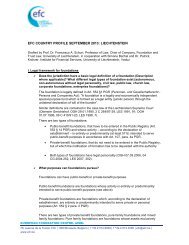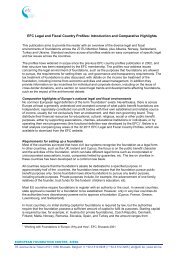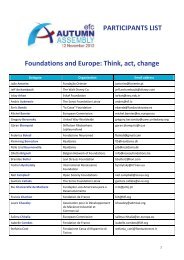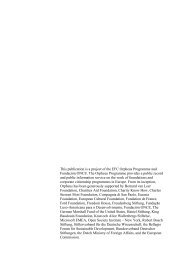European perspectives on global health: a policy glossary
European perspectives on global health: a policy glossary
European perspectives on global health: a policy glossary
Create successful ePaper yourself
Turn your PDF publications into a flip-book with our unique Google optimized e-Paper software.
4. Europe must establish<br />
a societal dialogue<br />
for <strong>global</strong> <strong>health</strong><br />
Corporate resp<strong>on</strong>sibility for<br />
<strong>health</strong><br />
Corporate resp<strong>on</strong>sibility is the obligati<strong>on</strong><br />
of a business to be accountable to all of<br />
its stakeholders, including shareholders,<br />
employees, communities in which businesses<br />
operate, suppliers and customers for the<br />
sustainability of its operati<strong>on</strong>s and activities<br />
not <strong>on</strong>ly in financial terms but also in relati<strong>on</strong><br />
to its social, <strong>health</strong> and envir<strong>on</strong>mental impacts.<br />
Some elements of corporate resp<strong>on</strong>sibilities are<br />
underpinned by legislati<strong>on</strong> and regulati<strong>on</strong>s, for<br />
example : those c<strong>on</strong>cerning obligati<strong>on</strong>s to pay taxes,<br />
account for financial performance, and protect the<br />
<strong>health</strong> and safety of employees and c<strong>on</strong>sumers.<br />
Other aspects of corporate resp<strong>on</strong>sibility, referred<br />
to as corporate social resp<strong>on</strong>sibility, may be seen as<br />
voluntary acti<strong>on</strong>s which exceed minimum standards<br />
of behaviour and may be m<strong>on</strong>itored against standards<br />
of good practice. These depend up<strong>on</strong> the value<br />
that company boards and employees, shareholders,<br />
customers and other stakeholders ascribe to good<br />
practice and the extent to which they are aware of<br />
these acti<strong>on</strong>s and impacts of the business.<br />
The importance of ensuring that Transnati<strong>on</strong>al<br />
Corporati<strong>on</strong>s ( TNCs ) are socially and envir<strong>on</strong>mentally<br />
resp<strong>on</strong>sible was recognised in the tripartite<br />
declarati<strong>on</strong> <strong>on</strong> multinati<strong>on</strong>al enterprises and<br />
social <strong>policy</strong> adopted by the Internati<strong>on</strong>al Labour<br />
Organizati<strong>on</strong> ( ILO ) in 1977. In 1999 Kofi Annan<br />
called <strong>on</strong> TNCs to commit to a <strong>global</strong> compact for<br />
resp<strong>on</strong>sible <strong>global</strong>ity and similar themes were evident<br />
in the United Nati<strong>on</strong>s C<strong>on</strong>ference <strong>on</strong> Trade and<br />
Development ( UNCTAD )’s World Investment Report<br />
of 2003 and the UN Sub-Commissi<strong>on</strong> <strong>on</strong> Human<br />
Global Health Policy Glossary<br />
Rights of the same year. In 2005 the UN Secretary-<br />
General named a special representative <strong>on</strong> human<br />
rights and trans-nati<strong>on</strong>al corporati<strong>on</strong>s to “identify<br />
and clarify standards of corporate resp<strong>on</strong>sibility and<br />
accountability for trans-nati<strong>on</strong>al corporati<strong>on</strong>s.” The<br />
United Nati<strong>on</strong>s has come to realise that the corporate<br />
resp<strong>on</strong>sibility agenda is bound to fail if it is not<br />
embedded in a framework of binding rules.<br />
In 2001 the Commissi<strong>on</strong> of the <str<strong>on</strong>g>European</str<strong>on</strong>g> Uni<strong>on</strong><br />
Green Paper <strong>on</strong> this topic defined corporate social<br />
resp<strong>on</strong>sibility as “a c<strong>on</strong>cept whereby companies<br />
integrate social and envir<strong>on</strong>mental c<strong>on</strong>cerns in their<br />
business operati<strong>on</strong>s and in their interacti<strong>on</strong> with their<br />
stakeholders <strong>on</strong> a voluntary basis”. The paper went<br />
<strong>on</strong> to stress the principle of voluntarism in corporate<br />
social resp<strong>on</strong>sibility, but argued that it was important<br />
for l<strong>on</strong>g term shareholder value and sustainability.<br />
Support for voluntary acti<strong>on</strong> to take resp<strong>on</strong>sibility<br />
for <strong>health</strong> may be backed by labelling – it has been<br />
proposed that the EU should establish a mark for<br />
goods produced under acceptable c<strong>on</strong>diti<strong>on</strong>s. It is also<br />
important to gain public recogniti<strong>on</strong> for those TNCs<br />
that meet guidelines for social resp<strong>on</strong>sibility, including<br />
<strong>health</strong> impacts. The Nuffield Trust has proposed a<br />
“Global Health Award” as an encouragement to those<br />
dem<strong>on</strong>strating best practice in this field. It is equally<br />
important to identify those TNCs which do not meet<br />
acceptable standards in order to inform and organise<br />
c<strong>on</strong>sumer acti<strong>on</strong>.<br />
However, the resp<strong>on</strong>sibility of TNCs for <strong>health</strong> is wider<br />
than simply compliance with voluntary codes such<br />
as the Organisati<strong>on</strong> for Ec<strong>on</strong>omic Cooperati<strong>on</strong> and<br />
Development ( OECD ) guidelines for TNCs. Adherence<br />
to internati<strong>on</strong>al c<strong>on</strong>venti<strong>on</strong>s and nati<strong>on</strong>al regulati<strong>on</strong>s<br />
<strong>on</strong> <strong>health</strong> and safety at work, envir<strong>on</strong>mental<br />
standards and c<strong>on</strong>sumer protecti<strong>on</strong> must be backed<br />
by internati<strong>on</strong>al and local enforcement acti<strong>on</strong> to<br />
49



